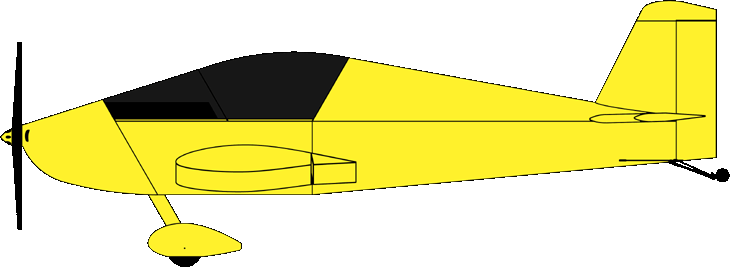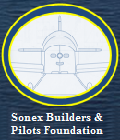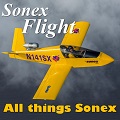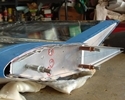

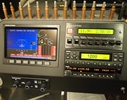
random user submitted photo
Revmaster R2300 on the Sonex?
31 posts
• Page 2 of 4 • 1, 2, 3, 4
Re: Revmaster R2300 on the Sonex?
Not to drag this out, but the other obvious "big VW" option would be the Scott Casler-built "2400". It's over $1000 less expensive than the Revmaster, like the Revmaster you don't have to build it yourself, and it has a beefed-up front hub and bearing (the Great Plains "Force One" hub) and crank. There's at least one of these in a Sonex already--Dave Clay in Texas is flying it. He seems happy with the engine.
Mark Waldron
Sonex 1230 (Builder: Jay Gibbs)
Aerovee, Trigear
Sonex 1230 (Builder: Jay Gibbs)
Aerovee, Trigear
- vigilant104
- Posts: 265
- Joined: Wed Nov 09, 2011 3:34 pm
- Location: Near Dayton, OH
Re: Revmaster R2300 on the Sonex?
*
Last edited by daleandee on Fri Jun 10, 2016 2:49 pm, edited 1 time in total.
-

daleandee - Posts: 877
- Joined: Fri Feb 01, 2013 6:14 pm
Re: Revmaster R2300 on the Sonex?
daleandee wrote:Chris9183 wrote:I think my main question with the Corvair is fuel efficiency. It's got a lot of power, so the main thing I'm wondering is if it will pull the Sonex fast enough to make up for the fact that it seems to gulp fuel. The R2300 won't get you to your destination as fast, but it won't drink as much gas. The Corvair drinks more gas, but will it get you to your destination in the Sonex fast enough to make things equal out?
Daleandee, what's your typical cruise speed in your Sonex with the 120hp Corvair?
Hi Chris,
I tend to run my Corvair a bit rich so my numbers may not be typical. I set my cruise at 2900 and see 136 TAS at less than 6 GPH cruising down low. Keep in mind that I have not yet installed the wheel pants and fairings. But to honest, and no offense to the VW flyers, there is more to this than fuel burn and that is reliability. I can only speak to the Aerovee conversion as I owned one for 175 hours. Somehow it seemed that I was always doing maintenance for little stuff, i.e. valve adjustments, valves leaking, oil leaks, ignition modules going south, etc. Add to that the constant battle with CHTs on hot days or flying heavy. I hated taking off in the heat knowing that at 1000' I would have to lower the nose to keep the heads cool. Take off from grass strips with a passenger were not fun unless you had no obstacles and were comfortable climbing at 300 fpm. I wasn't.
Here is some very good performance information from Dan Weseman:
http://flywithspa.com/flycleanexcom/cle ... mance.html
My Corvair may run too cool (if that's possible) as climb CHTs are 255ºF and cruise are in the 225 range (reading under the rear plugs). Oil temp can get to 220ºF on a really hot day but that reading is just before the cooler. Typical (such as yesterday or the trip to Crossville show 195-205). Smoothness is unreal and using a "certified" aircraft carb (Marvel MA3-SPA) means no dealing with burps or sticky slide carbs that pour fuel on the ground when you open the mixture.
There is a world of support for the FWF Corvair package as Sonex does not support it even though John Monnet liked Dan's set-up and told him so adding, "it ain't what I would have done." You can build, or buy the engine. Parts are available (mounts, cowling, cooling baffles, etc). As far as the weights, wing loadings, power loadings, light sport eligibility, etc; there is another thread on this list discussing that and proving the merits of the Cleanex.
Sorry so long winded ... can you tell I really like this engine? 8~)
Dale Williams
N319WF @ 6J2
Myunn - "daughter of Cleanex"
120 HP - 3.0 Corvair
Tail Wheel - Center Stick
51.2 hours / Status - Flying
http://www.youtube.com/channel/UC49h6Qijc17_Ebfz0CbRFtg
http://websites.expercraft.com/daleandee/
http://groups.yahoo.com/group/carolinasportflyers/
It's very good information, I like long winded posts.
Okay, I'm considering a Corvair again, but I can't find much in the way of prices. If I build my own engine, how much do you think a 120hp would cost me as opposed to ordering one already built? Do you think it'd be any cheaper?
- Chris9183
- Posts: 19
- Joined: Sun Nov 10, 2013 9:28 am
Re: Corvair Conversions For Sonex
*
Last edited by daleandee on Fri Jun 10, 2016 2:50 pm, edited 1 time in total.
-

daleandee - Posts: 877
- Joined: Fri Feb 01, 2013 6:14 pm
Re: Corvair Conversions For Sonex
daleandee wrote:Chris9183 wrote:Okay, I'm considering a Corvair again, but I can't find much in the way of prices. If I build my own engine, how much do you think a 120hp would cost me as opposed to ordering one already built? Do you think it'd be any cheaper?
Hi Chris,
Obviously building it would be less expensive than purchasing it. The cost would depend on what version of the engine you wanted and depend on whether you used a nitrated and reground original crank or opted for a brand new billet crank. Other items come into play as far as parts to use. For instance I have the ARP hardened rocker arm studs and exhaust valve rotators. A lot of engines don't use these items but I believe they are essential. You can use a cheaper carb but to me the Marvel Schebler is a perfect match and it's well proven on O-200 engines. I had my engine built by Dan Weseman for a few reasons. 1) Dan is an excellent mechanic and craftsman and stands firmly behind anything he touches. 2) I was busy building an air frame. 3) I wanted the assurance that the engine would perform well and last for many hours. I forget the exact amount I paid for mine but it was near 10K. Sound like a lot? I didn't think so then and I would make the same decision again. More than the Aerovee that I would have to assemble but half the cost of a Jabiru that I might have to reassemble after replacing the through bolts per their latest service bulletin.
Before you get too far into deciding to use this engine go to William Wynn's site and read about the conversion process. There are others that are selling Corvair conversions (or were) but for as eccentric as William seems to be to some folks he is, as is stated, "the Corvair Authority" and knows his stuff about these motors. They are not difficult engines to build or maintain. Much like the Sonex itself they are quite simple in construction but there are things that work, and things that don't. How close you want to build to the tried and beaten path will determine cost and reliability. To answer your question more directly I personally believe I could duplicate my engine if I were doing the work and scrounging parts for about the cost of the Aerovee.
Here are a few links to look at:
http://www.youtube.com/watch?v=kEuhtmYrA58
http://www.flycorvair.com/corvair.html
http://flycorvair.net/category/complete-engines/
(pricing info about half way down the page)
http://www.youtube.com/results?search_q ... cJLln7295Y
Hope this helps,
Dale
N319WF
PS: I changed the thread name so future searches would be easier.
Well it's gonna be awhile before I start building anyway. But if those performance specs you linked me earlier are real (GPH, MPH, RPM, etc) then I'm quite intrigued by this engine. Especially for the price. I wanted to build my own engine, but it doesn't look like they offer it in any sort of kit form, so I'll likely order it whole. I'll need to change some instrument plans on my Sonex to cut costs...I'm trying to keep my costs below $38k for the plane total. But for this engine, I think it's gonna be worth it.
I assume standard CHT/EGT/oil temp/oil pressure/manifold pressure guages can be hooked up to this engine?
- Chris9183
- Posts: 19
- Joined: Sun Nov 10, 2013 9:28 am
Re: Corvair Conversions For Sonex
*
Last edited by daleandee on Fri Jun 10, 2016 2:51 pm, edited 1 time in total.
-

daleandee - Posts: 877
- Joined: Fri Feb 01, 2013 6:14 pm
Re: Corvair Conversions For Sonex
daleandee wrote:Chris9183 wrote:Well it's gonna be awhile before I start building anyway. But if those performance specs you linked me earlier are real (GPH, MPH, RPM, etc) then I'm quite intrigued by this engine. Especially for the price. I wanted to build my own engine, but it doesn't look like they offer it in any sort of kit form, so I'll likely order it whole. I'll need to change some instrument plans on my Sonex to cut costs...I'm trying to keep my costs below $38k for the plane total. But for this engine, I think it's gonna be worth it.
I assume standard CHT/EGT/oil temp/oil pressure/manifold pressure gauges can be hooked up to this engine?
Yes, the standard package works well. I'm using the MGL singles and they were easy to wire up and work well with one exception ... the tach/hobbs. This seems to be a concern with these instruments regardless of the engine used. I used a Westach and a real Honeywell Hobbs meter as I could get the MGL to give a readout but it wasn't steady enough or absolutely correct.
As for saving money ... I put an $800.00 "rolled on paint job" on mine instead of a $5000.00 paint job. It ain't quite as pretty as a professional spray job but I'm satisfied with it. Of course that is another subject entirely but here's the result:
http://groups.yahoo.com/neo/groups/sone ... 1421311517
Best,
Dale
N319WF
Alrighty, well, I think I'm settled on the Corvair then. I'm not planning on doing a paintjob anyway, my Sonex is going to be just the polished aluminum taildragger, although I'm going to give the cowling and wheel pants a paint job to match the aluminum.
Here's how my cost list currently looks:
Kit: $15,695 (dual stick)
Corvair 120hp Engine (engine mount, baffling, cowling, manifold included): $13,900
Battery: $65
EFIS (FlightDEK-D180) from Dynon + Autopilot Servos ($750x2): $4,900
Heated Pitot Tube from Dynon: $450
Tools: $350
Propeller (Ivoprop, 2 blade composite, in-flight adjustable): $1,200
Shipping: $200
COM Radio, Headset Adapter, Push-to-Talk Button, Cigg Adapter: $372
COM Antenna: $80
Intercom: $100
Headset x2: $200
Upholstry: $725
Nylon Rear Bulkhead: $100
Hardware: $1,093
iFly 7" GPS: $840
AveoFlash Lighting: $400
Throttle/Mixture Knobs: $174
Keyed Ignition: $125
Hobbs Hour Meter: $27
Transponder: $500
Margin of error: $1,000
TOTAL: $42,580
Do I seem to be missing anything here? Seems realistic to me but I've never built an airplane before.
- Chris9183
- Posts: 19
- Joined: Sun Nov 10, 2013 9:28 am
Re: Revmaster R2300 on the Sonex?
I just called one of the guys from the Flywithspa.com and asked a lot of questions about the Corvair and Cleanex in general...and I am SOLD!! Corvair all the way. In the future I'm planning to drive somewhere and meet up with someone who flies a Cleanex and maybe go for a short flight in it if they'll let me. I live in Shelbyville, TN.
- Chris9183
- Posts: 19
- Joined: Sun Nov 10, 2013 9:28 am
Re: Revmaster R2300 on the Sonex?
The Corvair is high on my list as well. I don't remember where I saw it but on Wynne's website he shows that if you build it yourself you can save appx. $2,000 on the engine. He said that you can build the 120hp with Weseman bearing and all the other goodies for about $9,500. That's the engine he charges $11,750 for if he builds it.
I don't personally have any experience with Wynne or the Corvair but I have seen in person the Sonex that Weseman built and talked to the guy who owns it and he loves the Corvair. He told me he wouldn't have anything else.
I can tell you this, I've seen this guy do low altitute high speed passes at full load and that Sonex is smoking fast and had a great climbout.
I don't personally have any experience with Wynne or the Corvair but I have seen in person the Sonex that Weseman built and talked to the guy who owns it and he loves the Corvair. He told me he wouldn't have anything else.
I can tell you this, I've seen this guy do low altitute high speed passes at full load and that Sonex is smoking fast and had a great climbout.
- GhostRider32
- Posts: 8
- Joined: Tue Nov 05, 2013 1:06 pm
Re: Revmaster R2300 on the Sonex?
*
Last edited by daleandee on Fri Jun 10, 2016 2:51 pm, edited 1 time in total.
-

daleandee - Posts: 877
- Joined: Fri Feb 01, 2013 6:14 pm
31 posts
• Page 2 of 4 • 1, 2, 3, 4
Who is online
Users browsing this forum: No registered users and 88 guests
